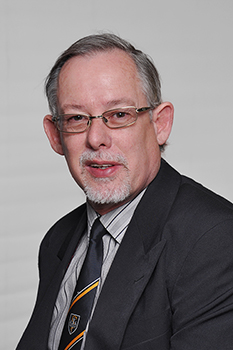Latest News Archive
Please select Category, Year, and then Month to display items
02 January 2025
|
Story Gerda-Marie van Rooyen
|
Photo Supplied
 Leading the research in South Africa is Prof Linus Franke from the Department of Soil, Crop and Climate Sciences.
Leading the research in South Africa is Prof Linus Franke from the Department of Soil, Crop and Climate Sciences.
Scientists are actively pursuing the successful breeding of diploid hybrid potatoes from inbred lines. This is expected to revolutionise potato breeding as it holds the key to rapid genetic progress. It will introduce new varieties for commercialisation through seed. Currently, existing potato variants have a gene that renders self-pollinated seeds infertile.
Prof Linus Franke, an academic in the Department of Soil, Crop and Climate Sciences at the UFS, is leading the research in South Africa. “This technology allows the production of genetically uniform potato seed that is easy to transport and largely disease-free.” He says this differs from conventional breeding whereby only vegetative propagation is possible due to tetraploid varieties in potatoes. It also risks carrying pests and diseases from one generation to the next – leading to the accumulation of pests and diseases with each round of multiplication.
Seed innovation
Prof Franke explains that Solynta BV, a seed company based in the Netherlands that produces potato varieties that can be grown from seed, has included South Africa in their research efforts because it is one of Africa’s largest producers and exporters. Through his academic relationship with Wageningen University and Research, a Dutch institution renowned for its agricultural endeavours and food production, the UFS became involved in researching hybrid potatoes grown from seed.
Diploid seeds containing two sets of chromosomes allow easier gene manipulation to increase predictability and speedier genetic progress. The breeding approach enables the incorporation of tolerance to pests, diseases, abiotic stresses (cold, heat, drought) and other desired genetic traits.
Although Prof Franke is optimistic about this research, he is not blind to disadvantages. “Potato seeds are tiny and have little energy reserves, making it harder to grow potatoes from seed than from tubers.” He says potatoes from seed will take longer to cultivate than tubers, as farmers need to grow plantlets from seeds first, adding six weeks to the growing period. “It is possible that commercial farmers can grow potatoes directly from seed. Alternatively, perhaps more likely, specialised growers will produce tubers of potatoes from seed; these tubers are then sold as seed tubers to other potato farmers, who then continue their normal practices of producing potatoes for the market from tubers.”
Financial benefits
Prof Franke says farmers have reason to get excited. “Seed potatoes will reduce input costs, as varieties with enhanced tolerance to pests and diseases require less pesticides. Planting one hectare of potatoes requires three to four tonnes of potato tubers, but only one 25 g packet of potato seeds.” Since potatoes are a more valuable commodity than maize, this technology might also increase farmers’ income potential.
Dean of Health Sciences receives prestigious international fellowship
2015-11-11

Dean of the Faculty of Health Science,
Prof Gert van Zyl
|
The Dean of our Faculty of Health Science, Prof Gert van Zyl, was admitted as an Inaugural Fellow of the Association for Medical Education in Europe (AMEE) at the annual conference in Glasgow.
This fellowship recognises members of AMEE who have demonstrated a consistent commitment to excellence in health professional education through scholarly contributions to the field over at least five years. Prof Van Zyl was honored with a Fellowship for his senior role related to education at the UFS, including his scholarly contributions. “This was an enormous privilege for me to be awarded the AMEE full Fellowship as one of only two South Africans to receive this honour from a prestigious organisation such as the AMEE. It also gives credit to the excellent work done by the team in the South African Association of Health Educationalists (SAAHE), and the Health Science Education team in the Faculty of Health Sciences at the UFS. All the leadership, hard work, and excellence over many years are acknowledged with this Fellowship. My appreciation to colleagues that motivated and inspired me during my academic journey to achieve this fellowship,” says Prof Van Zyl.
In seeking Fellowship of AMEE, applicants make a commitment to continue their leadership and the promotion of scholarship in health professional education into the future, as well as to the ongoing mentorship and development of more junior members who aspire to recognition at Associate Fellow or Fellow level. Fellows are expected to contribute actively to AMEE activities.
Prof Van Zyl was also recently appointed by the Minister of Health, Dr Aaron Motsoaledi, as Council Member representing Higher Education on the Health Professions Council of South Africa (HPCSA).